A
Age restrictions
The age of consent is 16 throughout New England, and you have to be 21 to drink legally in each of the six states. To drive, you need to be 16 in Connecticut, Vermont, and Maine, 17 in New Hampshire, and 18 in Massachusetts and Rhode Island.
B
Budgeting
It will cost around $7 for a beer or a glass of house wine. A main course at a budget restaurant runs to around $10, at a moderate one $25, and at an expensive one over $25.
Budget, moderate, and deluxe accommodations are under $75, between $75–200, and over $200, respectively. Be aware that in Boston, prices are usually 20 percent higher than elsewhere for the same accommodations.
A taxi from Boston’s Logan Airport to a hotel in the Back Bay area will cost around $33. Single bus and subway tickets in Boston cost $2 and $2.25, but are reduced to $1.70 and $1.70 if you buy a Charlie Card (for more information, click here).
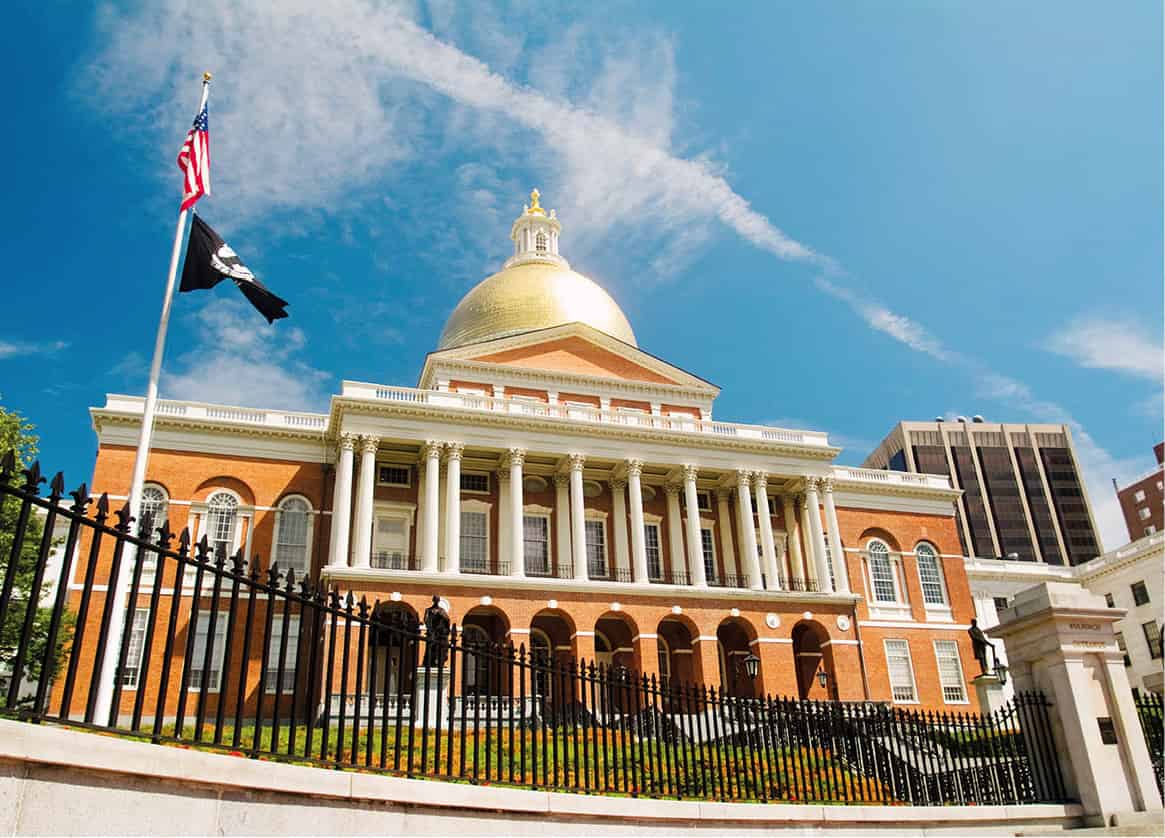
Massachusetts State House
Nowitz Photography/Apa Publications
C
Children
It is easy to travel in New England with kids. There are hands-on museums, state and theme parks, and toy- and bookstores throughout the region; and, with good planning, driving distances between destinations can be kept relatively short. Note that laws in each state are quite specific about driving with children in a car. Be sure to tell the car-rental agency in advance how old your children are, so that they will have the proper-size car seats available, and check with them about state requirements.
Many restaurants offer kids’ menus, but some – particularly more expensive ones – may not welcome young children at dinner. Lodgings generally welcome children, and do not charge for those under 18, although $10 or $15 may be added to the bill for a cot or crib.
Clothing
In winter, warm clothes and waterproof shoes are a must. For all other seasons, assume that you will encounter at least one cool spell, and carry a sweater or light jacket. Raingear is advisable, particularly in spring. For climate information, click here.
Like the rest of the US, New England has grown increasingly less formal over recent years, and casual clothing will see you through most situations. However, shorts, jeans, and T-shirts are still frowned upon in many of the better restaurants, particularly in cities; the finest Boston establishments – as well as a few traditional mountain, seaside, and lake resorts – still expect jackets (and, in a few cases, ties) for men. A neat pair of khakis together with a blazer is virtually fail-safe; women should not encounter any problems with a casual dress or pantsuit.

Red Sox fans
Nowitz Photography/Apa Publications
Crime and safety
Boston is one of the safest cities in the US, but visitors should always be vigilant. Areas where crime is a problem offer few tourist attractions and are on the fringes of the city. Equally, New England’s urban areas are among the safest in the US. Nevertheless, always lock car doors, and don’t leave valuables visible in your car or hotel room.
Customs
Anyone over 21 may bring 200 cigarettes, 100 cigars, or 3lbs of tobacco, 1 liter of alcohol, and a maximum of $100 worth of duty-free gifts. Importing meat products, seeds, plants, or fruits is illegal, as are narcotics. You may take out anything you wish, but consult with the authorities of your destination country for its customs regulations on entry.
D
Disabled travelers
Boston caters well to the disabled traveler, with accessible bathrooms and ramps on public buildings, curbsides, and at most attractions. However, it is also an old city with colonial buildings and cobblestone sidewalks, so despite best efforts it is not always perfect. Check the Massachusetts Bay Transit Authority’s website (www.mbta.com) for public transport access information for disabled travelers, including details of its The Ride service for door-to-door paratransit. For more information, call tel: 617-222-5123 or TTY 617-222-5415. Boston’s Commission for Persons with Disabilities can be reached on tel: 617-635-3682 or via www.boston.gov/departments/disabilities-commission.
Elsewhere in New England the situation is similar. Consult Mobility International USA (www.miusa.org), and the Society for Accessible Travel & Hospitality (http://sath.org).
E
Electricity
The US uses 110–120V, 60-cycle AC voltage (as opposed to the 220–240V, 50-cycle of Europe). Laptops and many travel appliances are dual-voltage and will work, but check first. An adapter will be needed for US sockets.
Embassies and consulates
Most embassies are based in Washington, DC, but many countries have consulates in Boston; a complete list can be found at www.embassypages.com/city/boston.
Embassies
Australia: 1601 Massachusetts Avenue, Washington, DC; tel: 202-797-3000; www.usa.embassy.gov.au.
Consulates
Canada: 3 Copley Place, Suite 400; tel: 617-247-5100; www.can-am.gc.ca.
Ireland: 535 Boylston Street; tel: 617-267-9330; www.dfa.ie.
UK: 1 Broadway, Cambridge; tel: 617-245-4500; www.gov.uk
Emergency number
Ambulance, Fire, and Police: tel: 911.
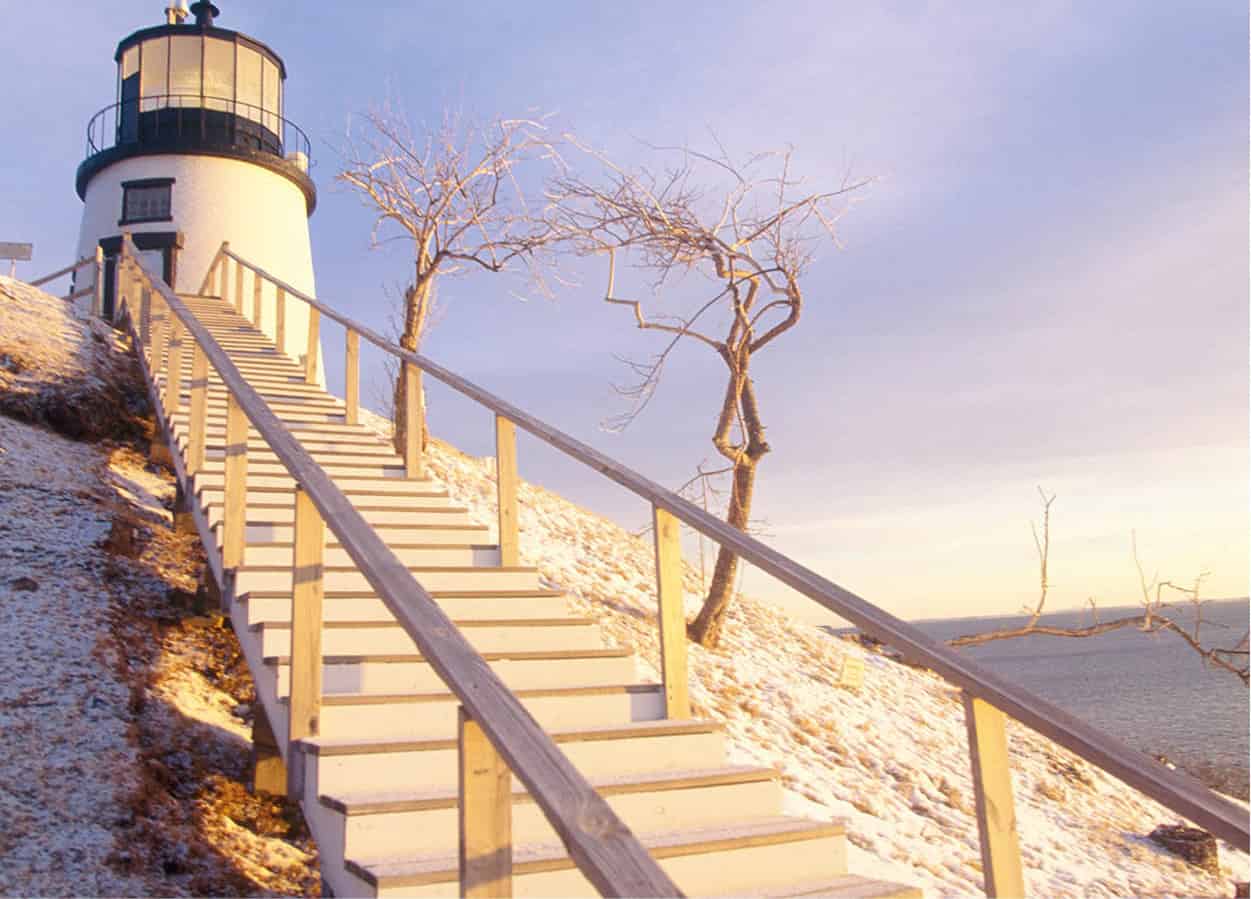
Penobscot Bay lighthouse
Kindra Clineff
G
Green issues
While many urban centers in New England practice recycling, the six states have a patchy record when it comes to environmental protection; the needs of industry and commerce have often trumped green considerations. The Conservation Law Foundation works to solve the most pressing environmental problems facing New England; its achievements have included protecting the Georges Bank from oil drilling and overfishing, ending decades of sewage dumping into Boston Harbor, preserving Vermont’s bear habitats, and saving New Hampshire’s Franconia Notch from a four-lane highway.
Air travel produces a huge amount of carbon dioxide and is a significant contributor to global warming. If you would like to offset the damage caused to the environment by your flight, a number of organizations can do this for you using online ‘carbon calculators’ that tell you how much you need to donate. In the UK travelers can visit www.climatecare.org or www.carbonneutral.com; in the US log on to www.climatefriendly.com or http://sustainabletravel.org.
H
Health and medical care
Sunburn will be the most common medical nuisance for most visitors. Even so, don’t leave home without travel insurance to cover yourself and your belongings. It is not cheap to get sick in the United States.
Tap water is safe to drink, but avoid stream water as it can cause giardia, an intestinal disorder spread by wild animal wastes. Use a filter or purification tablets, or boil water, when hiking or camping.
Pharmacies. These stock most standard medication (although some painkillers that are available over the counter in other countries may be prescription-only in the US), and staff are trained to help with most minor ailments. Across New England you will find branches of the pharmacy CVS (www.cvs.com). A central one in Boston is: 587 Boylston Street; tel: 617-437-8414.
Hospitals. These are signposted on highways with a white H on a blue background. Major hospitals have 24-hour emergency rooms; you may have a long wait before you get to see the doctor, but the care and treatment are thorough and professional.
Walk-in clinics are commonplace in cities, where you can consult a nurse or doctor for a minor ailment without an appointment. If cost is a concern, turn first to clinics offering free or pro-rated care (look then up in the Yellow Pages).
Major hospitals include:
Connecticut: Hartford Hospital, 80 Seymour Street; tel: 860-545 5000; https://hartfordhospital.org.
Maine: Maine Medical Center, 22 Bramhall Street, Portland; tel: 207-662-0111; www.mmc.org.
Massachusetts: Massachusetts General Hospital, 55 Fruit Street, Boston; tel: 617-726-2000; www.massgeneral.org.
New Hampshire: Portsmouth Regional Hospital, 333 Borthwick Avenue; tel: 603-436-5110.
Rhode Island: Rhode Island Hospital, 593 Eddy Street, Providence; tel: 401-444-4000; www.rhodeislandhospital.org.
Vermont: University of Vermont Medical Center, 111 Colchester Avenue, Burlington; tel: 802-847-0000; www.uvmhealth.org.
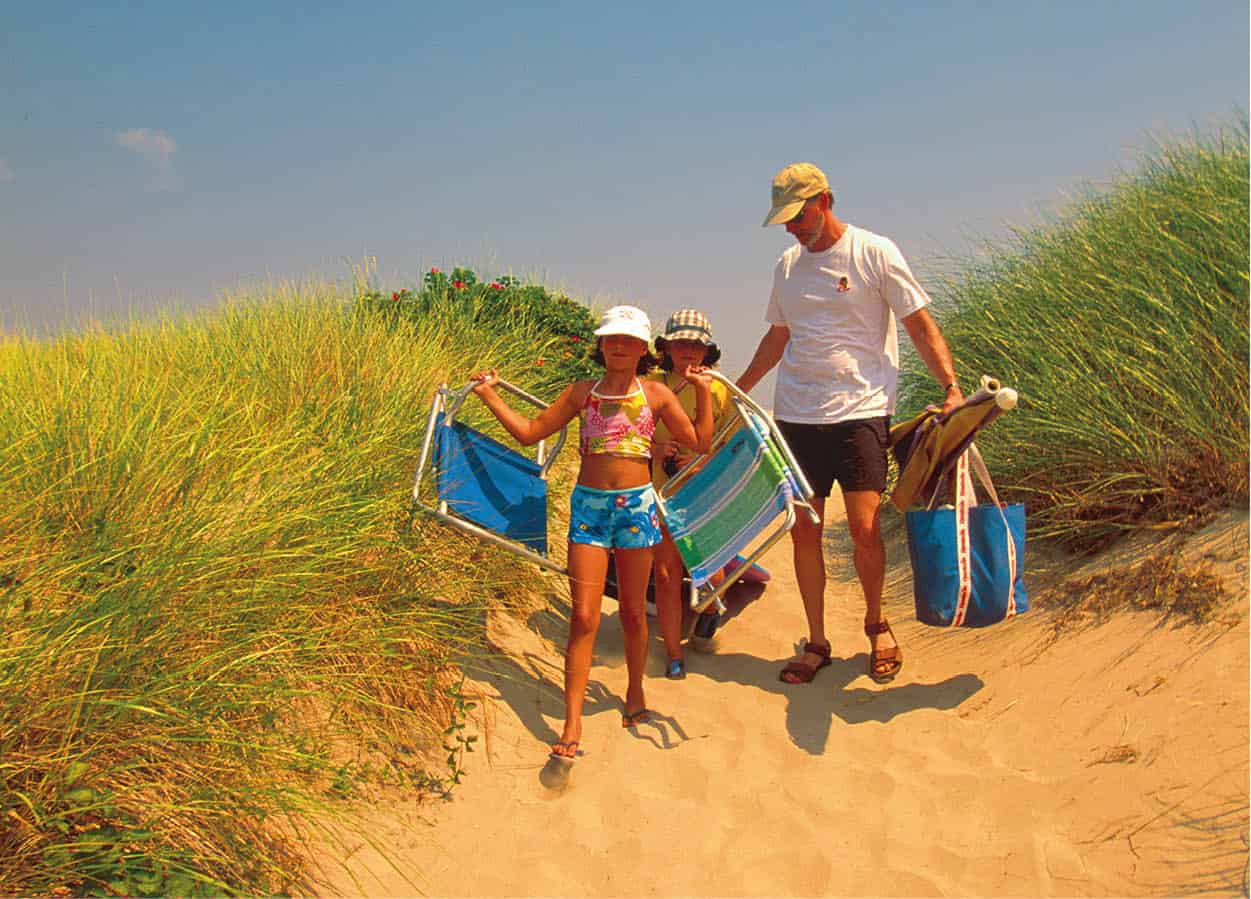
Getting ready to sunbathe on a Rhode Island beach
Kindra Clineff
Hours and holidays
Most offices open Mon–Fri 9am–5pm. Federal and local government offices usually open Mon–Fri 8.30am–4.30pm. Banks open Mon–Fri 9am–4pm. Some also open until 5pm on Thu and Sat 9am–noon.
Public holidays
All government offices, banks, and post offices are closed on public holidays. Public transportation does not run as often on these days, but most shops, museums, and attractions are open.
Jan 1 – New Year’s Day
Third Mon Jan – Martin Luther King Jr. Day
Third Mon Feb – President’s Day
Mar/Apr – Easter Sunday
Third Mon Apr – Patriots’ Day
Last Mon May – Memorial Day
July 4 – Independence Day
First Mon Sept – Labor Day
Second Mon Oct – Columbus Day
Last Thu and Fri Nov – Thanksgiving
Dec 25 – Christmas
I
Internet
Throughout New England wireless internet access is nearly ubiquitous in cafés, restaurants, pubs, many student-type hangouts, and plenty of hotels and guesthouses, and most public libraries allow free access via their computer terminals.
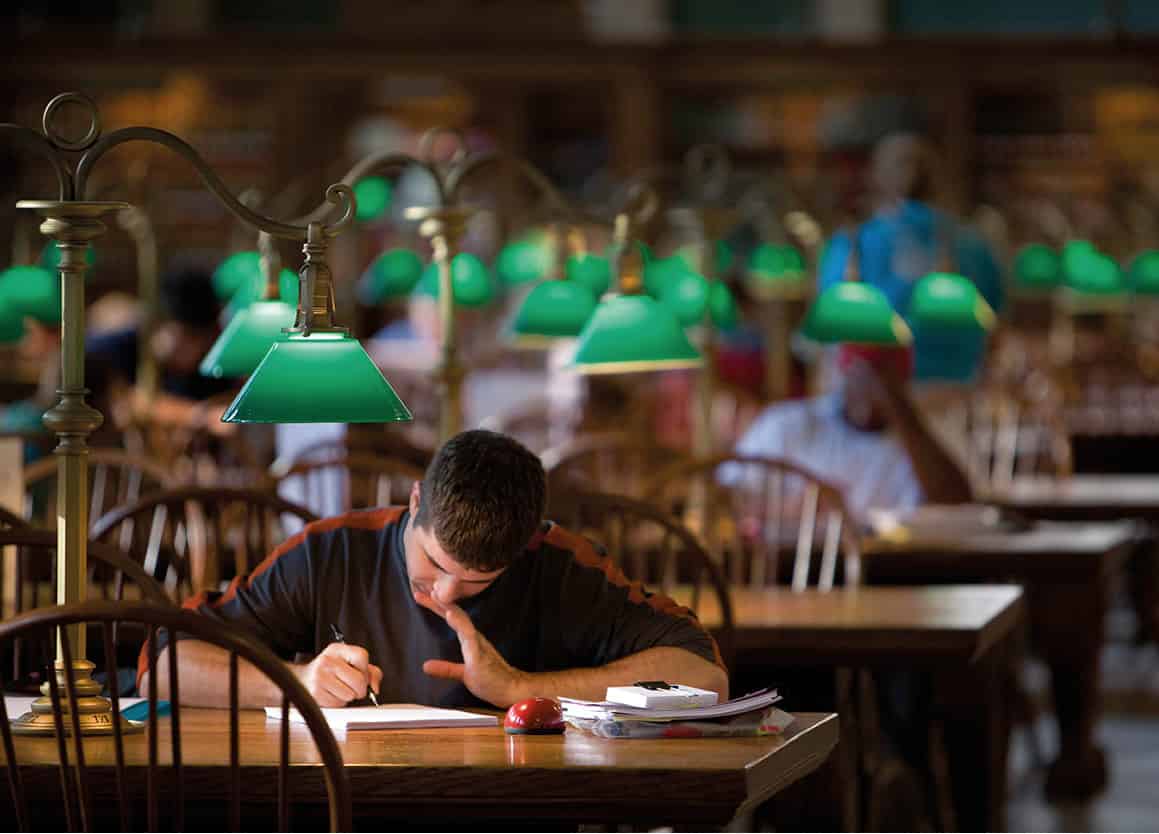
Boston Public Library
Nowitz Photography/Apa Publications
L
LGBTQ travel
Massachusetts is famous as the first US state to legalize same-sex marriage. In general, Boston is a very integrated city, so you will find people of all orientations mingling in many city neighborhoods. The South End has the highest concentration of gay bars and is also the home of the annual Boston Pride parade. The National Gay and Lesbian Chamber of Commerce (http://nglcc.org) has information on businesses owned, operated, or supported by the local gay community in New England.
Northampton in Massachusetts emerged as a lively enclave for gay women in the late 20th century, and Provincetown on Cape Cod has long been one of the country’s best-known gay summer vacation spots. You will also find sizeable LGBTQ communities and bars in Providence and Portland.
Bay Windows (www.baywindows.com) is a free weekly newspaper covering LGBTQ news, culture, and nightlife in Boston and New England. There’s also http://boston.edgemedianetwork.com.
Left luggage
Security concerns in recent years have resulted in left-luggage facilities being closed in places such as bus and train stations. Your best option is to ask whether you can leave luggage at your hotel.
Lost property
Most establishments operate their own lost-and-found department, but if you lose something in a public area, go to the local police station in the event it was turned in.
Lost or stolen credit cards:
Amex: tel: 1-800-528-4800
Diners Club/Carte Blanche: tel: 1-800-234-6377
MasterCard: tel: 1-800-627-8372
Visa: tel: 1-800-847-2911
M
Maps
Insight Guides’ FlexiMap Boston is laminated for durability and easy folding, and contains travel information as well as exceptionally clear cartography. For driving, try The American Map New England Road Atlas (www.americanmap.com).
Media
Newspapers. As well as the US nationals, such as USA Today and the financial Wall Street Journal, New England has many local newspapers, including The Boston Globe (www.boston.com), Boston Herald (www.bostonherald.com), Hartford Courant (www.courant.com), Portland Press Herald (www.pressherald.com), and Burlington Free Press (www.burlingtonfreepress.com). The Christian Science Monitor (www.csmonitor.com), a prestigious newspaper published in Boston on weekdays, is strong on international news, and throughout New England you will be able to get hold of copies of The New York Times (www.nytimes.com).
Magazines. The Improper Bostonian (www.improper.com), a free bi-weekly magazine, includes entertainment listings. A good online source is DigBoston (https://digboston.com). Out in western Massachusetts, the Valley Advocate (www.valleyadvocate.com) is a great resource for Pioneer Valley.
Useful monthly magazines include Boston Magazine (www.bostonmagazine.com), Yankee (www.yankeemagazine.com), and the Maine-focused Down East (www.downeast.com).
Television. Most hotels receive the three major national networks (ABC, CBS, and NBC), many cable networks including CNN, Fox, and ESPN (sports), and several premium movie channels, including HBO. The Public Broadcasting System (PBS) has some of the better-quality programs.
Radio. AM radio is geared toward talk, news, and information programming. FM stations tend to offer specific music formats, such as country or classic rock. Red Sox games are broadcast on over 60 stations throughout New England, anchored in Boston by WRKO-680 AM (www.wrko.com) and WEEI-93.7 FM (www.weei.com). New England Patriots games are aired on WBCN-98.5 FM (www.wbcn.com). National Public Radio (www.npr.org), known for in-depth news coverage, classical music, and special programing, has affiliates throughout New England.
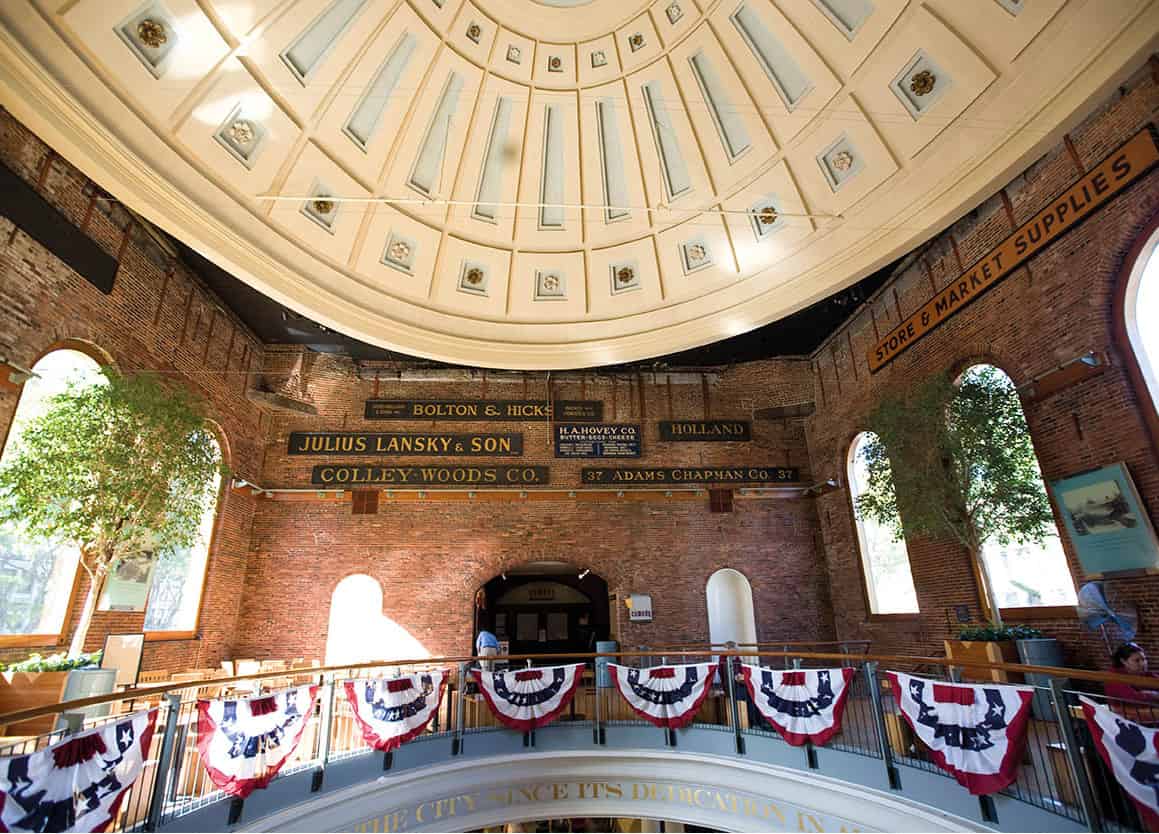
Rotunda at Boston’s Quincy Market
Nowitz Photography/Apa Publications
Money
Currency
Paper money is issued in $1, $5, $10, $20, $50, and $100 denominations.
Coins come in seven denominations: 1¢ (a penny); 5¢ (a nickel); 10¢ (a dime); 25¢ (a quarter); 50¢ (a half dollar; infrequently seen); gold-colored coins worth $1 (which are nearly the same size and hue as the quarter and are universally despised and rarely used); and the rarely-seen silver dollar.
ATMs
ATMs are ubiquitous in all but the smallest of towns throughout New England, and, although they charge a fee, they are an extremely convenient way to get cash as you need it. They will convert your transaction automatically at a generally good rate. Unlike Europe, most places in the US are not equipped to handle currency exchange, even in major cities.
Credit cards
Credit cards are almost universally accepted, except in some very small towns and a few eateries. Some are more welcome than others. Visa and MasterCard are taken almost everywhere, but American Express is occasionally not accepted. Discover is another card with relatively wide acceptance. Most cards charge a fee of 3 percent for international transactions and do not convert at a favorable rate. Almost all retailers accept debit card purchases and pre-paid debit cards.
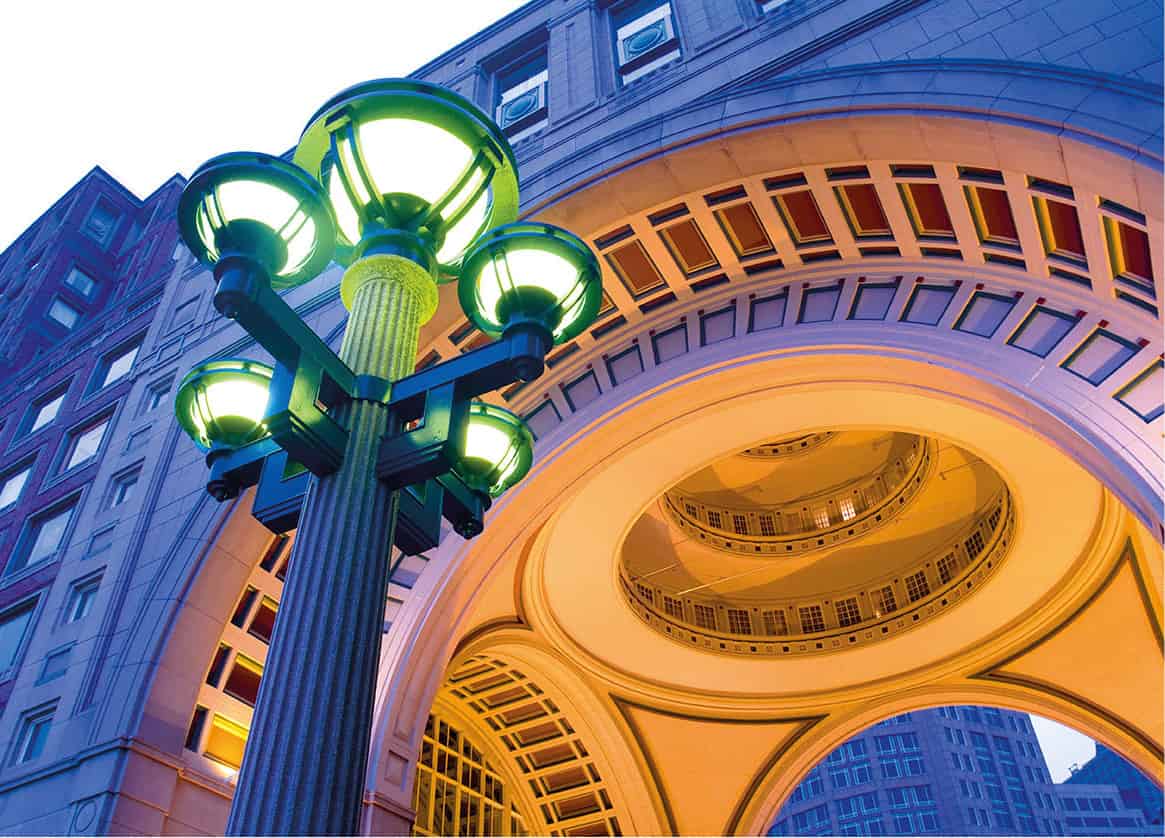
Twilight at Rowes Wharf in Boston
Nowitz Photography/Apa Publications
Currency exchange
International visitors can exchange funds at exchange booths at Logan Airport: Sovereign Bank BCE Travelex Foreign Exchange (tel: 800-287 7362; www.travelex.com) booths are open daily at terminals B and E, and they have an office open daily at 745 Boylston Street in downtown Boston. There is a Bank of America Exchange at terminal C. All exchanges charge a processing, service, and/or administration fee,
Up-to-the-minute exchange rates are posted on www.x-rates.com.
Travelers’ cheques
Though they are becoming less and less popular, travelers’ checks are accepted by many businesses, although smaller establishments may be hesitant to accept, and make change for, larger denominations. When exchanging checks for cash, you will get the best rate at banks: hotels generally give a poor rate. Most financial establishments will charge a commission fee when cashing travelers’ checks.
Tipping
Tipping is voluntary, but waiters, taxi drivers, bartenders etc will all expect a gratuity amounting to 15 percent of the bill, or 20 percent for above-average service. On restaurant checks over $100, a 20 percent tip is the norm. Tips are not included in restaurant checks, except for big parties; when calculating, do not tip on tax. Doormen, skycaps (airport porters), and porters receive about $1 per bag.
Tax
All New England states levy taxes on meals and accommodation, and all but New Hampshire on all sales. When restaurants and hotels quote prices, these taxes are not normally included – so ask, as they can bump up the cost by up to 12 percent. Ticket prices for transport have the tax included.
P
Post
Post offices are usually open Mon–Fri 8am–5pm, Sat 8am–noon. In Boston, the main post office is at 25 Dorchester Street (behind South Station; tel: 617-654-5302; www.usps.gov; daily 24 hours). Mail may be addressed to General Delivery at any post office; make sure the zip code is included in the address. At time of printing, it cost $1.15 to send a postcard or a letter to Europe.
S
Smoking
The legal age in New England to buy tobacco is 18. Smoking is banned in most indoor public places and on transport. All states ban smoking in restaurants. Hotels have non-smoking rooms; many inns and B&Bs ban smoking.
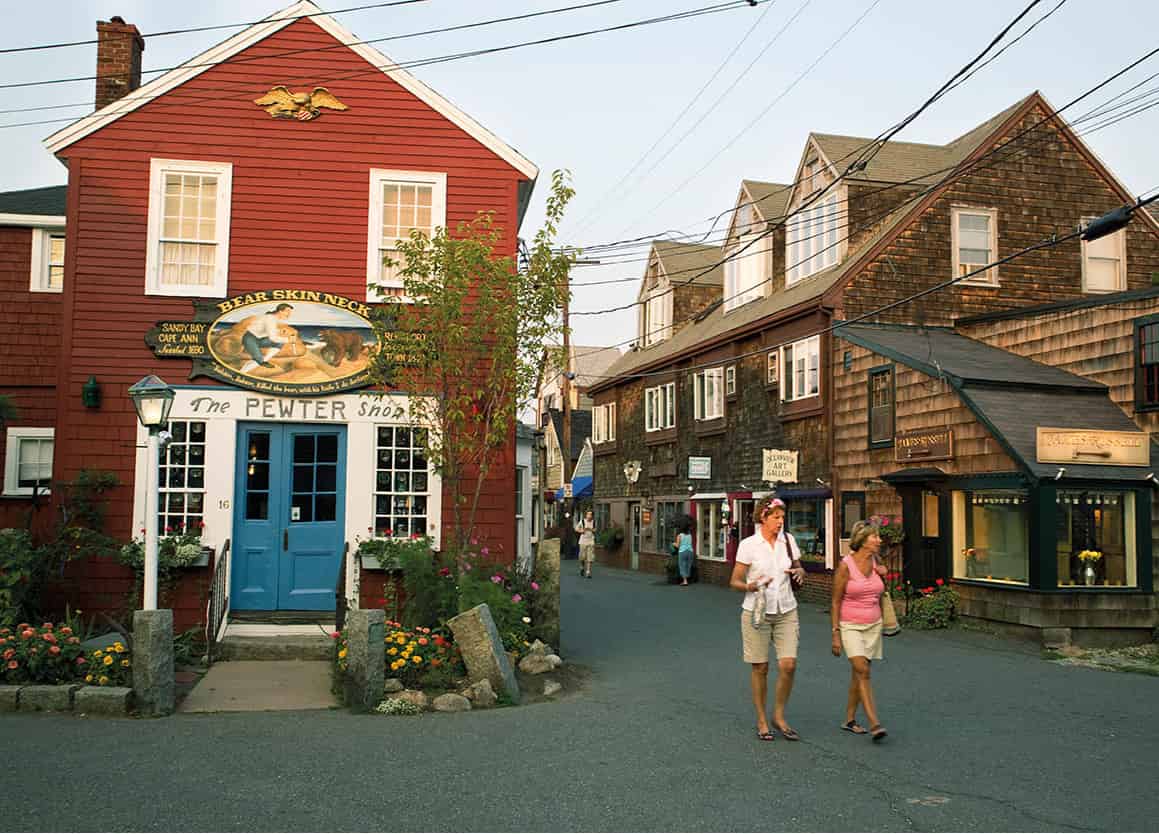
Rockport
Nowitz Photography/Apa Publications
T
Telephones
Phone numbers. All telephone numbers have 10 digits. If you are calling outside the local area then a 1 precedes the 10-digit number.
The Greater Boston area code, included in the number even when calling within the city, is 617. Surrounding towns use 508 (Plymouth and Provincetown), 781 (Lexington and Concord), and 978 (Salem and Cape Ann).
Four states in New England have one code each: Maine (207), New Hampshire (603), Rhode Island (401), and Vermont (802). In Connecticut, Hartford numbers are preceded by 860, those for New Haven by 203. Check all other locations in the directory.
Numbers beginning with codes 800 or 888 are toll-free if dialled within the US.
Calling from abroad. To contact the US from the UK, dial 00 (international code) + 1 (US) + a 10-digit number. For calls to other countries from the US, dial the international access code (011), then the country code, city code, and local number. Directory assistance is 555-1212 preceded by 1 and the area code you are calling from or inquiring about; so for Boston dial 1-617-555-1212.
Cell phones. The popularity of cell phones means that you will find few public telephone booths across New England. Newer handsets from Europe and Asia work in US cities, but reception in suburban and rural areas tends to be patchy. This is improving as the US upgrades its cell infrastructure. Pay-as-you-go SIMS that will work in your phone, depending on the model, can be purchased from outlets throughout the region. Main companies are AT&T (www.att.com), Sprint (www.sprint.com), and Verizon (www.verizon.com).
Time zones
All of New England is on Eastern Standard Time: three hours ahead of Los Angeles, one hour ahead of Chicago, five hours behind London, and 15 hours behind Tokyo. New England is one hour behind the Canadian provinces of New Brunswick and Nova Scotia. Daylight Saving Time is in effect between specified dates in early April and early November; turn clocks ahead one hour in spring, back one hour in fall.
Tourist information
Connecticut Commission on Culture & Tourism, 2nd floor, 1 Constitution Plaza, Hartford; tel: 860-256-280/1-888-288-4748; www.ctvisit.com.
Maine Office of Tourism, 59 State House Station, Augusta; tel: 1-888-624-6345; www.visitmaine.com.
Massachusetts Office of Travel and Tourism, 10 Park Plaza, Suite 4510, Boston; tel: 617-973-8500/1-800-227-6277; www.massvacation.com.
New Hampshire Office of Travel & Tourism Development, 172 Pembroke Road, Concord; tel: 603-271-2665/1-800-386-4664; www.visitnh.gov.
Rhode Island Tourism Division, 315 Iron Horse Way, Providence; tel: 1-800-556-2484; www.visitrhodeisland.com.
Vermont Department of Tourism & Marketing, 1 National Life Drive, 6th floor, Montpelier; tel: 802-828-3237/1-800-837-6668; www.vermontvacation.com.
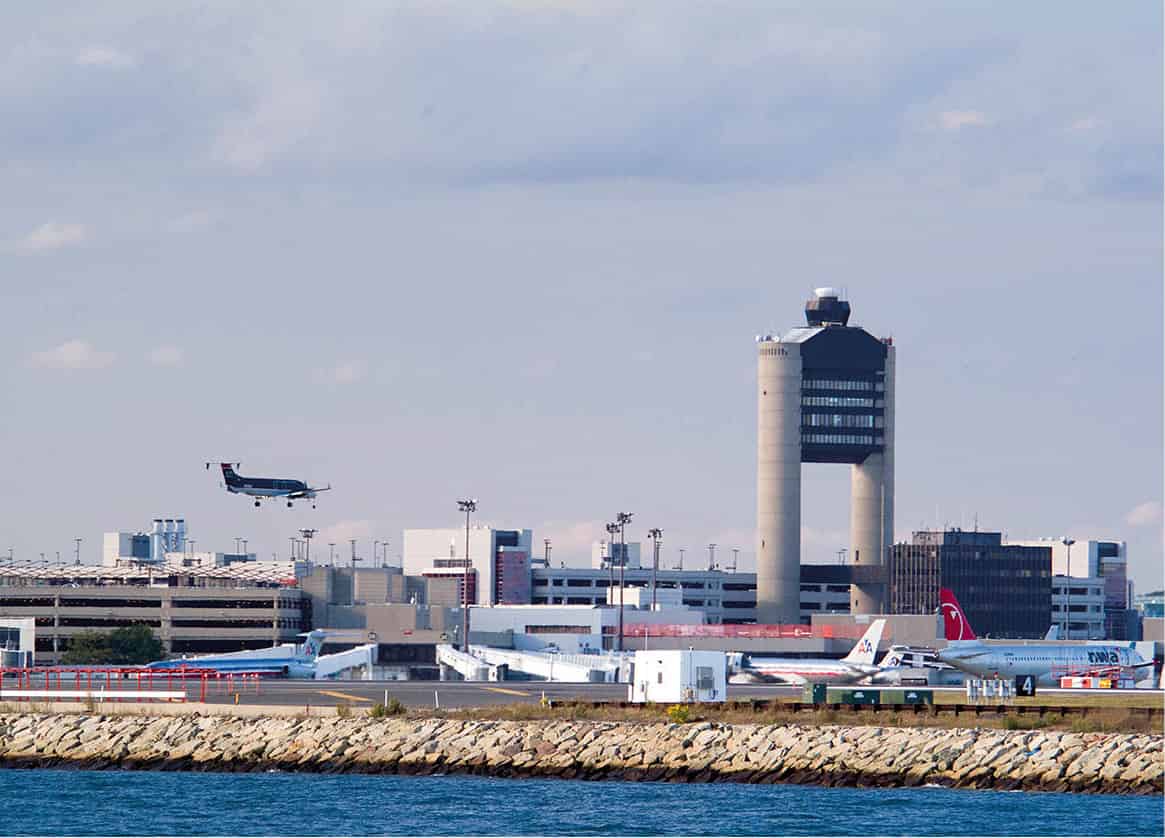
Coming in to land at Logan Airport
Nowitz Photography/Apa Publications
Boston and Cambridge
The Greater Boston Convention & Visitors Bureau (2 Copley Place; tel: 617-536-4100/1-888-733-2678; www.bostonusa.com) runs two visitor centers:
Boston Common Visitor Information Center, 148 Tremont Street; Mon–Fri 8.30am–5pm, Sat–Sun 9am–5pm (the booth here marks the start of the Freedom Trail).
Prudential Visitor Center, Center Court, Prudential Center, 800 Boylston Street; Mon–Sat 10am–5pm, Sun 11am–8pm.
The Cambridge Office of Tourism (4 Brattle Street; tel: 617-441-2884/1-800-862-5678; www.cambridgeusa.org;) has a booth in the center of Harvard Square (tel: 617-497-1630; Mon–Fri 9am–5pm, Sat–Sun 9am–1pm).
Transportation
Arrival by air
Boston’s Logan Airport (tel: 1-800-235-6426, www.massport.com), the main access point for international travelers to New England, has four terminals (A, B, C, E). Airlines do not necessarily use the same terminal for domestic and international flights. There are free wheelchair-lift-equipped shuttle buses that run between the terminals.
Regional airports include:
Bradley International, Windsor Locks, Connecticut; tel: 860-292-2000; www.bradleyairport.com.
Portland International Jetport, Portland, Maine; tel: 207-774-7301; www.portlandjetport.org.
Manchester-Boston Regional Airport, 1 Airport Road, Manchester, New Hampshire; tel: 603-624-6556; www.flymanchester.com.
T. F. Green Airport, 2000 Post Road, Warwick, Rhode Island; tel: 401-737-8222; www.pvdairport.com.
Burlington International Airport, Airport Drive, South Burlington, Vermont; tel: 802-863-2874; www.btv.aero.
Each state also has several smaller airports, most with limited commuter service. Visitors to southern parts of New England often choose to fly into one of the major New York City area airports – Kennedy, La Guardia, or Newark – and continue their travels via rail, bus, or rental car.
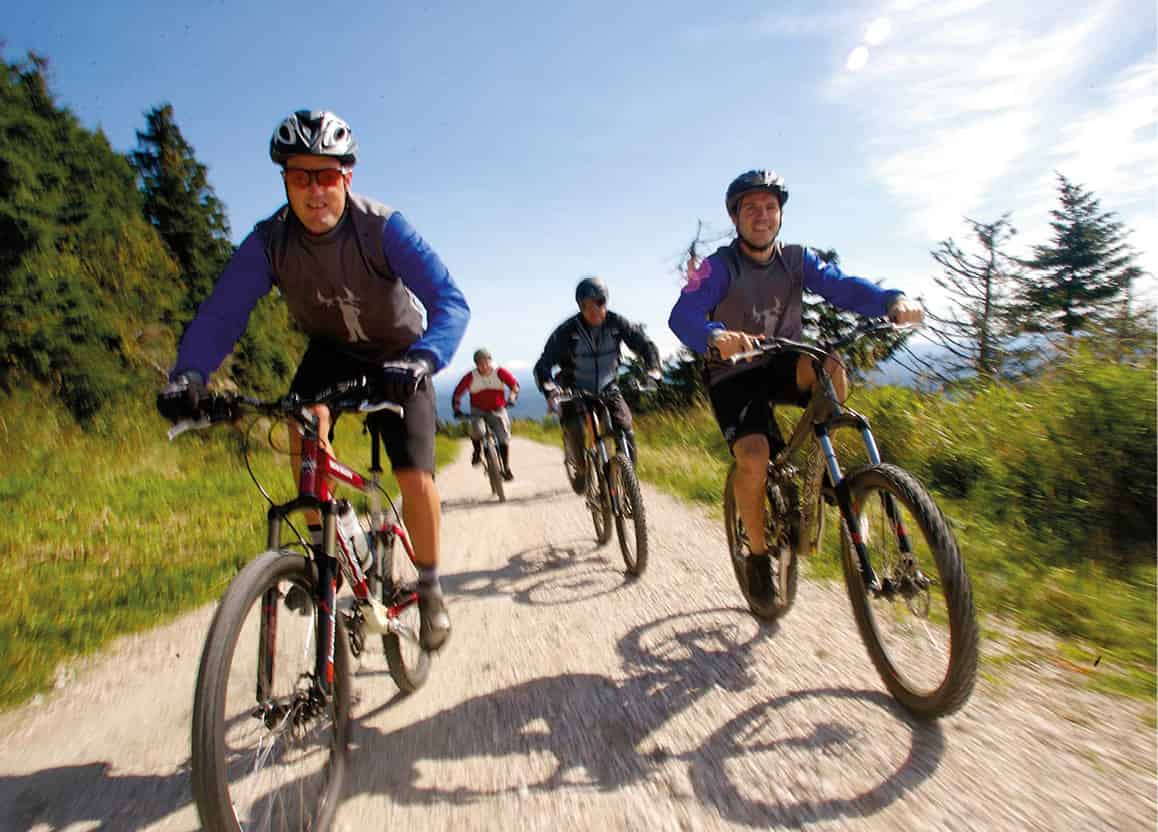
Mountain biking at Killington
Killington and American Skiing Co
Arrival by land
By train. Amtrak (tel: 1-800-872-7245; www.amtrak.com) operates several routes that serve major New England cities and points in between. Boston’s South Station is the north terminus of Amtrak’s Northeast Corridor, linking the city with New York and Washington, DC, via Providence and New Haven; trains – including the high-speed, extra-fare Acela – run frequently every day. The Lake Shore Limited runs daily between Boston and Chicago, with stops at Worcester and Springfield, Massachusetts. The Downeaster connects Boston’s North Station with Portland, Maine. The Vermonter operates daily between Washington, DC, and St Albans, Vermont, via New York City, Hartford, Springfield, and major Vermont cities and towns. The Ethan Allen Express runs between New York and Rutland, Vermont.
By bus. Greyhound (tel: 1-800-231-2222; www.greyhound.com) and its regional affiliates serve major population centers and in-between points throughout New England, and link the region with its terminals in New York, Montreal, and points south and west.
By car. New England is well served by the US Interstate Highway system. I-95, the coastal artery, connects New York with New Haven, Providence, Boston, and Portland. East–west I-84 links southern New York State with eastern Massachusetts via Hartford. The Massachusetts Turnpike (I-90) joins the New York Thruway near Albany. North–south I-89 crosses into Vermont from Quebec southeast of Montreal, and links with Boston-bound I-93 at Concord, New Hampshire. North–south I-91 runs between New Haven and the Vermont-Quebec border.
Within New England
Driving. New England is best traveled by automobile. In addition to the Interstate Highway system, the region is served by an excellent system of secondary federal and state highways, and county and municipal roads. Roads are generally well maintained, with every effort made to remove snow promptly; but in rural areas you might encounter miles of unpaved roads that can be tricky in winter or in the mud season that arrives with the spring thaw.
Road signs can cause problems even for experienced locals – you won’t have trouble on major routes, but you may feel abandoned on some secondary roads. It is always a good idea to travel with detailed maps or GPS.
The speed limit on Interstate Highways in New England is 65mph (105kph), except in urban areas where it is 55mph (90kph). On secondary highways in rural areas it is usually 50mph (80kph). In built-up areas you must slow to 20–40mph (32–64kph); city speed limits rarely exceed 25mph (40 kph). Look out for signs – limits can change abruptly, especially on the outskirts of towns. A right turn on a red traffic signal is permissible after a complete stop anywhere in New England, except where there is a No Turn on Red sign. At a rotary (roundabout), yield to vehicles already in it.
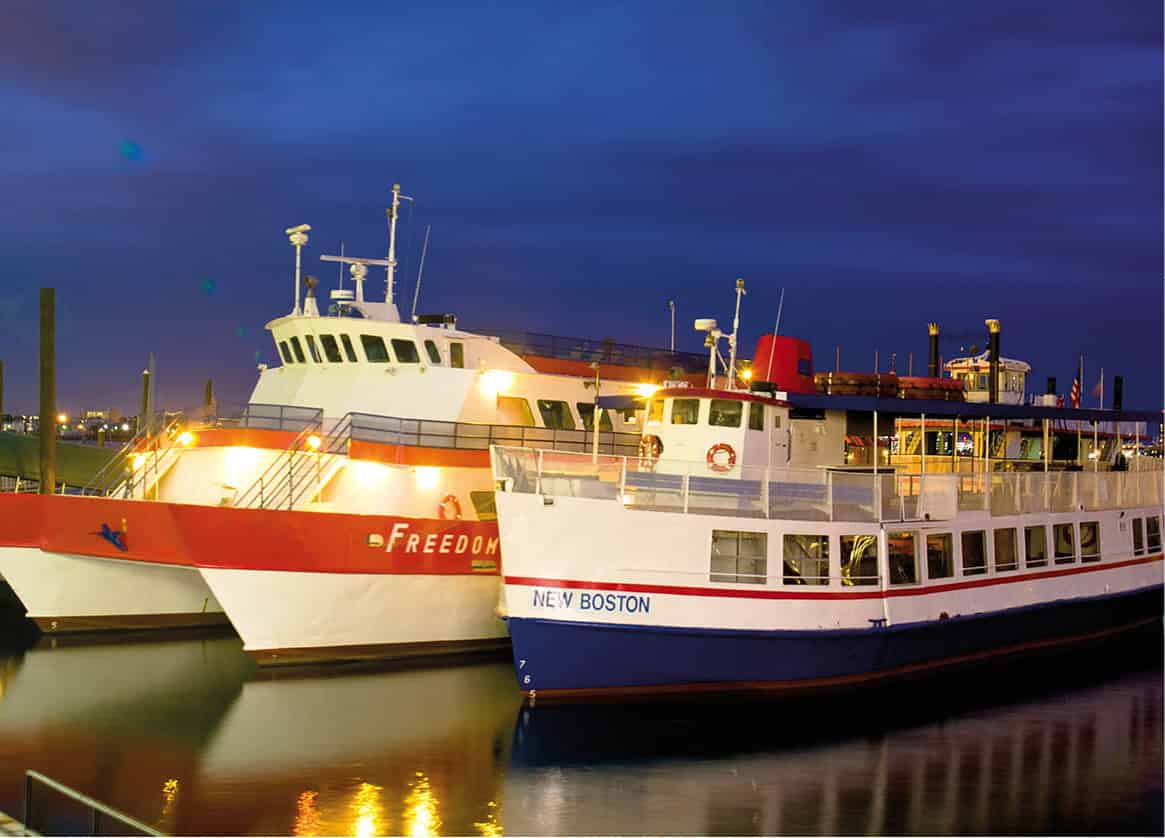
Boston ferries
Nowitz Photography/Apa Publications
Car rental. Major US car-rental firms are represented at Boston’s Logan Airport, as well as at smaller airports and city locations throughout New England. Note that drivers must be 21 to rent a car, and that rental agreements may forbid taking a car rented in New England to New York or New Jersey without payment of a surcharge. Children under the age of five or under 40lbs (18kg) must be protected by a child safety seat, available at extra cost.
By train. In addition to Amtrak routes, commuter rail transportation is provided in eastern Massachusetts and between Boston and Providence by the Massachusetts Bay Transportation Authority (tel: 617-222-3200/1-800-392-6100; www.mbta.com). The MBTA also operates Boston’s system of subways (called ‘the T’), trolleys, and elevated trains.
To use the subway, purchase a CharlieTicket ($2.75) from the machines in the stations. A single ticket permits travel on the entire ‘Outbound’ length of a line, but there’s an ‘Inbound’ surcharge on extensions of the Green Line. If you board the T at surface stations where there is no ticket machine, you will need the exact fare as conductors do not carry change.
The CharlieCard is a plastic stored-value card. If you use this, then each ride is $2.25 and you can get free transfers to MBTA buses (not possible with the CharlieTickets). Accompanied children under 11 travel free.
By bus. An MBTA bus service connects Boston with its suburbs and outlying cities. Other city areas in New England also have a local bus service. For intercity bus travel within the region, contact Greyhound (see opposite) or Peter Pan Bus Lines (tel: 1-800-343-9999; www.peterpanbus.com). Plymouth and Brockton Buses (tel: 508-746-0378; www.p-b.com) link Boston with Cape Cod and Massachusetts’s South Shore, while C&J (tel: 603-430-1100; www.ridecj.com) offers a bus service between Boston and Portsmouth.
By ferry. Between mid-May and October it is possible to catch ferries from Boston to Salem and to Provincetown (www.bostonharborcruises.com and www.baystatecruisecompany.com).
Taxis
Portland, Maine: ASAP Taxi, tel: 207-791-2727, www.asaptaxi.net.
Boston, Massachusetts: Boston Cab, tel: 617-536-5010; The Good Taxi tel: 617-855-6500.
Cambridge, Massachusetts: Cambridge Taxi Cab, tel: 617-649-7000; Green Cab & Yellow Cab, tel: 617-876-5000.
Portsmouth, New Hampshire: Great Bay Taxi, tel: 603-431-4555, www.greatbaytaxi.com.
Providence, Rhode Island: Airport Taxis, tel: 401-737-2868, www.airporttaxiri.com.
Burlington, Vermont: Green Cab, tel: 802-864-2424, http://greencabvt.com.
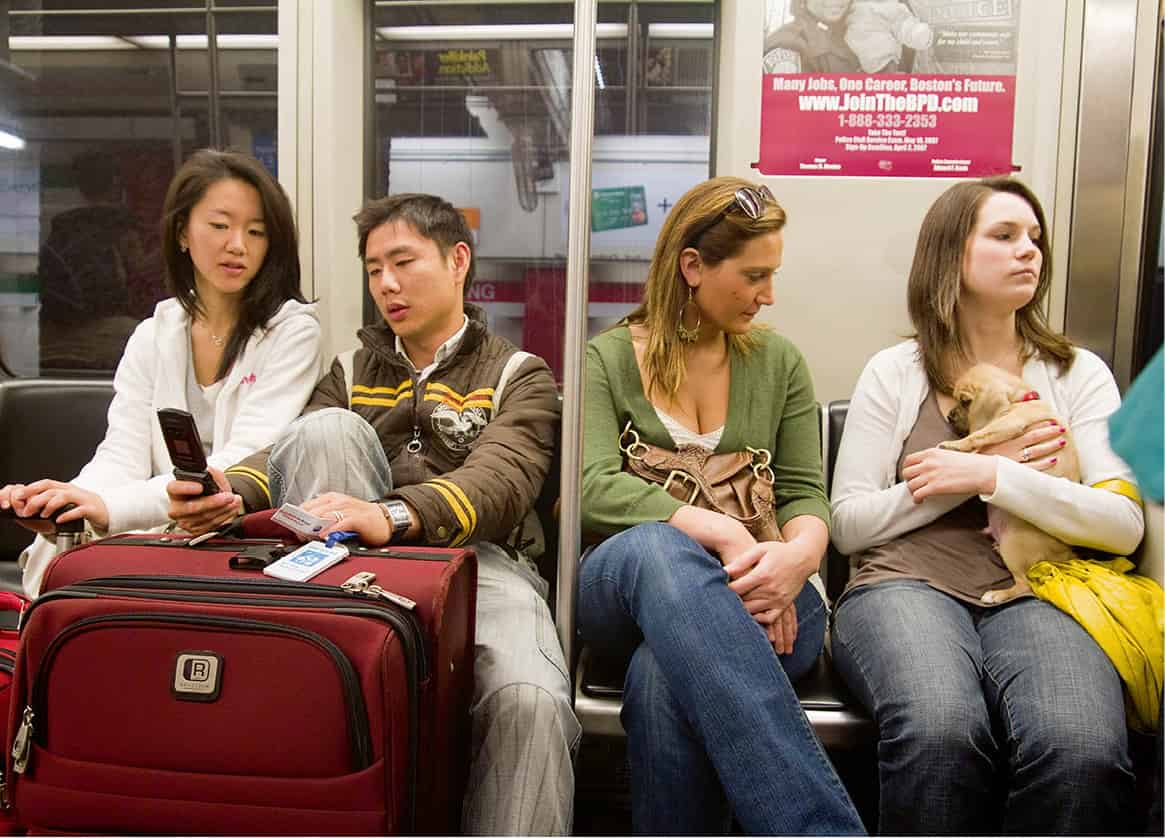
Riding the T
Nowitz Photography/Apa Publications
Passes
Boston LinkPass. The LinkPass is a cost-effective way for visitors to use the MBTA system in and around Boston. It allows unlimited use of the subway, buses, water shuttle, and Zone 1A of the commuter rail lines for one ($12) or seven days ($21.25), or one month ($84.50). LinkPass cards can be purchased at almost all stations. Monthly LinkPasses are only valid on subways and buses.
City Tourist Card. The Boston Card (tel: 1-800-887-9103; www.smartdestinations.com) is a one-, two-, three-, five-, or seven-day visitor pass, which offers unlimited admission to more than 41 attractions and tours in and around Boston. Cards can be bought online and downloaded to any mobile device or printed at home
V
Visas and passports
Immigration and visitation procedures can change rapidly depending on real and perceived threats to security.
To enter the United States, foreign visitors need a passport and many also need a visa. You may be asked to provide evidence that you intend to leave the United States after your visit is over (usually in the form of a return or onward ticket).
You may not need a visa if you are a resident of one of 27 countries that participate in the Visa Waiver Program (VWP) and are planning to stay in the US for less than 90 days. Consult the nearest US embassy or consulate in your home country or check www.travel.state.gov. You must, however, log onto the Electronic System for Travel Authorization’s unmemorably named website, www.cbp.gov/travel/international-visitors/esta at least 48 hours before traveling and provide personal information and travel details; either your application will be accepted (and will be valid for multiple visits over two years) or you will be told to apply for a visa.
Websites
For general tourist information about New England, see www.visitnewengland.com and www.discovernewengland.org.